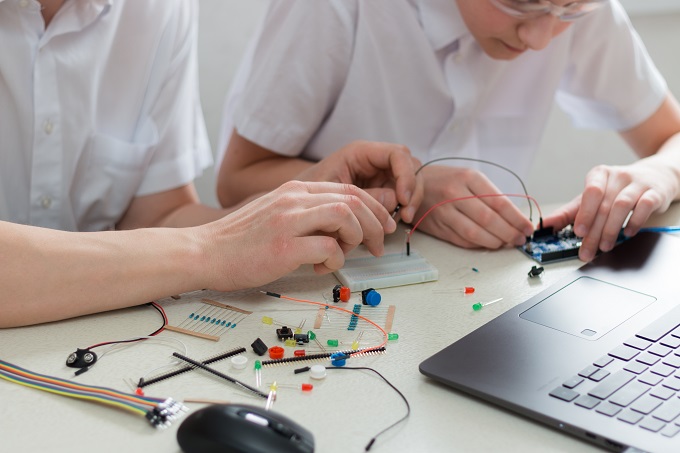
© AlesiaKan - stock.adobe.com
<p><main class="main-container container js-quickedit-main-content" role="main"></p>
<div class="row">
<section class="col-xs-12">
<div class="region region-content">
<div class="node node--type-article node--view-mode-full ds-three-col">
<div class="ds-three-col__column ds-three-col__main">
<div class="prose field field--name-body field--type-text-with-summary field--label-hidden field--item">
<h3><span lang="EN-AU" >Thousands of Pacific learners across fifty schools in Auckland will have a Pacific-centred government mathematics initiative expanded this week.</span></h3>
<p><span lang="EN-AU" >The expansion will be rolled out over four years and cost $7.2 million. According to the Ministry of Education, the Developing Mathematical Inquiry Communities or ‘DMIC’ programme aims to &#8220;boost Pacific students’ maths outcomes by supporting schools to leverage their learners’ Pacific knowledge and culture&#8221;. </span></p>
<p>Associate Minister of Education Jenny Salesa said: <span lang="EN-AU" >“DMIC draws on students’ Pacific culture and heritage to support their success in maths. For example, students will use traditional Pacific crafts like <em>tivaevae</em> (Cook Islands quilt making) and <em>ta’ovala</em> (Tongan weaving) to engage better with complex mathematical thinking and algebraic patterns.&#8221;</span></p>
<blockquote>
<p><span lang="EN-AU" >“This funding will see teachers work differently with their students in mathematics, and support schools to build a stronger sense of belonging and identity for their Pacific students as mathematicians.”</span></p>
</blockquote>
<h2><span lang="EN-AU" >Funding will be used to provide:</span></h2>
<ul>
<li>three days of professional development over a year for teachers;</li>
<li>in-class mentoring for teachers at each school;</li>
<li>teacher mathematics workshops held after school for staff;</li>
<li>parent and community mathematics workshops; and</li>
<li>mathematics workshops for students in the school holidays.</li>
</ul>
<p><span lang="EN-AU" >“Teachers are taught how to listen – to hear the mathematics thinking that children are doing as learners work and explain their thinking. By doing this, teachers can identify the different types of mathematical thinking that learners are using and build on this to extend learning for all students in the class.”</span></p>
<blockquote>
<p><span lang="EN-AU" >“The future of learning is through project-based work and mixed-ability groups and DMIC encourages this. Children can benefit from moving from streaming, or same-ability grouping, to mixed-ability groups so that they are able to build on the multiple strengths and capabilities of every member of the group.”</span></p>
</blockquote>
<p> &#8220;<span lang="EN-AU" >We’re investing in the roll out of the successful DMIC programme because we know our Pacific students have so much more to contribute through maths if teachers and students, alongside their families, are given the right support to make the connections between mathematics learning and Pacific cultures. We’re excited to be able to roll it out to more schools, more students and more families.”</span></p>
<p> <span lang="EN-AU" >“This funding will deliver training and wraparound support for teachers, children and school communities through workshops and in-class mentoring. Success in maths for Pacific learners in this way can lead to better learning outcomes and improved wellbeing at school.”</span></p>
<blockquote>
<p> <span lang="EN-AU" >“Complex maths is embedded in Pacific cultures and expanding DMIC is about reclaiming our mathematics legacy to ensure our Pacific learners have thriving futures through maths.”</span></p>
</blockquote>
<p><span lang="EN-AU" >“New Zealand has the capacity to produce a new generation of Pacific mathematicians ready to go into our universities, businesses and research facilities; this is the next step to unlock that potential,” said Jenny Salesa. </span></p>
</div>
</div>
</div>
</div>
</section>
</div>
<p></main></p>
<footer class="footer" role="contentinfo">
<div class="container">
<div class="region region-footer"> </div>
</div>
</footer>

NZCER found generative AI tools are frequently used to support teaching and learning in primary…
The Ministry decision to discontinue a reading resource over kupu Māori has angered the sector…
NCEA was designed to broaden educational success, explains David Pomeroy from the University of Canterbury.
More than just a break from the classroom, a visit to a zoo or wildlife…
Without proper maintenance and care, trees can become a hazard. Are your trees in need…
Loneliness and social disconnection negatively impact wellbeing. A new WHO report finds teens feel the…
This website uses cookies.